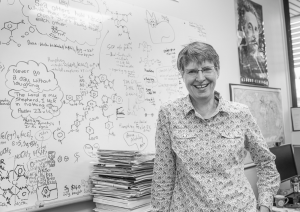Our research programmes over the years
18 April, 2023
Professor Richard Blaikie (Deputy Director upon the Institute’s establishment in 2002 and the Institute’s Director from 2008-2011) says the evolution of the Institute’s research programmes over time clearly showed both the adoption of new research areas and that many of the Institute’s core research elements had endured.
“Clearly there are elements of using materials’ properties at the nanoscale that are enduring, via chemical physical or engineering approaches, but with an evolution to move the focus of applications more towards global challenges of climate change and sustainability.”
He says it was very positive to see more prominence for Mātauranga Māori and recalls that there had been initiatives in the Mātauranga Māori space right from the start.
“There had been support for te reo Māori physics resources in collaboration with the NZIP from right at the time of our founding in 2002.”
Looking at the research programmes over time, founding Principal Investigator Professor Jeff Tallon notes that the Institute’s superconductivity work had shifted substantially from fundamental research to applied and development research.
“There’s a sharp focus on mission-led research rather than blue skies research back at the beginning.”
Professor Simon Brown, who has been a Principal Investigator with the Institute since 2002, says he had noticed a shift towards chemistry and biology since the first days of the Institute.
“There were of course researchers at the outset who focused in this area, and the link to Alan MacDiarmid himself of course was strong, so polymers were already a big feature. There was also more of emphasis on nanofabrication in the early days.”
A particular highlight for me is seeing the substantial growth in the extent and depth of our partnership with iwi.
Professor Sally Brooker Principal Investigator The MacDiarmid Institute
Principal Investigator Professor Sally Brooker, who joined the Institute in 2008, says that a particular highlight for her was seeing the substantial growth in the extent and depth of our partnership with iwi. “You can see this illustrated in the word clouds by the increasing prominence of the words ‘Mātauranga Māori’ and ‘Taonga’ in our rebid in 2019. Our commitment to continuing to accelerate this growth is clearly demonstrated by the recent appointment of Associate Professor Pauline Harris as the Institute’s inaugural Deputy Director Māori, and of Diane Bradshaw as Stakeholder Relations Partner Iwi.”
“You can see this illustrated in the word clouds by the increasing prominence of the words ‘Mātauranga Māori’ and ‘Taonga’ in our rebid in 2019. Our commitment to continuing to accelerate this growth is clearly demonstrated by the recent appointment of Associate Professor Pauline Harris as the Institute’s inaugural Deputy Director Māori, and of Diane Bradshaw as Stakeholder Relations Partner Iwi.”
She says the word clouds also showed a significant shift over the years towards directly addressing the many aspects of climate change.
“Climate change is a huge current challenge that our MacDiarmid Institute team is well placed to contribute to addressing. The Institute’s directors over the years, in particular our founding Director Sir Paul Callaghan and our current Co-Directors Professors Nicola Gaston and Justin Hodgkiss, are to be congratulated on leading these substantial and strategic shifts in focus as the Institute and its research has evolved.
“It is essential that we as an Institute continue to develop and evolve to remain current and relevant.”
Sally says the word clouds also reveal that a consistent theme over the years has been ‘polymers’, and in particular ‘conducting polymers’.
“This is highly appropriate given that it was conducting polymers that led to Professor Alan McDiarmid’s Nobel Prize in Chemistry.”


